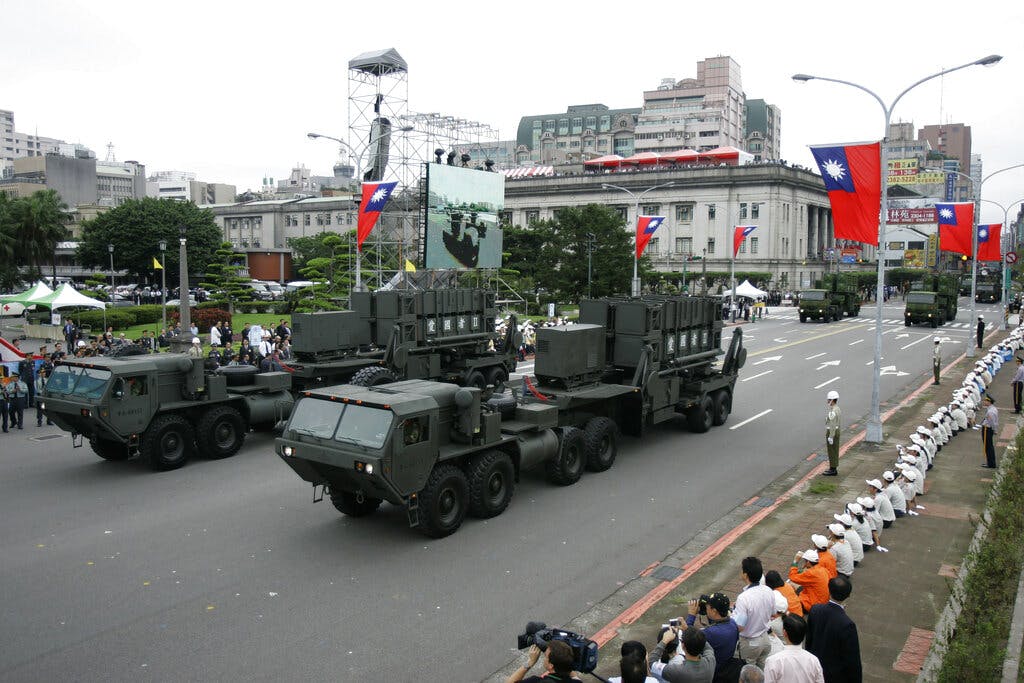Worry More About Taiwan Than Ukraine, America Is Warned
‘Everything should be going to Asia to deal with the Chinese threat…. We will have to deprioritize everything else in the meantime.’

Here’s a blunt warning about Ukraine from a leading defense strategist: America cannot get overly involved in the defense of that country because it must focus on defending Taiwan and preventing Communist Chinese dominance in the Pacific.
Such is the argument being advanced by the architect of America’s 2018 National Defense Strategy, Elbridge Colby. The son of a late director of central intelligence, William Colby, he is the author of “The Strategy of Denial,” which was issued in 2021 and lays out how U.S. defense strategy must change to deal with the rise of a superpower China.
When the Sun spoke with Mr. Colby, he urged a laser-like focus on the Pacific. While “we have an interest in an autonomous Ukraine,” he argued that the Europeans, especially the Germans, should shoulder most of the burden of defending Europe.
America “doesn’t have enough of the key type of forces” to fight both Russia over Ukraine and China over Taiwan, Mr. Colby says. “Everything should be going to Asia to deal with the Chinese threat until we have that blinking green. We will have to deprioritize everything else in the meantime.”
We can afford to take the risk in Europe, Mr. Colby argues, “because Europe is both less important than Asia economically and geopolitically and also because our allies in Europe are far more capable of shouldering a big part of the burden of defending against Russia than our Asian allies are against the far stronger China.”
“The premise of the conversation,” Mr. Colby says, “has to be restrained resources. If somebody is not grappling with constraints … they shouldn’t be taken seriously.”
Mr. Colby contends that prioritization is going to require novel thinking in second theaters. “People,” he says, “are going to have to acknowledge that they aren’t a priority and yet still make it work. This does not mean ignoring the secondary theater — but credible strategies need to account for the fact that Europe is a secondary interest and the Middle East a tertiary one. They need to internalize and act like Asia is the top priority and still come up with ways to defend our important interests alongside our allies and partners.”
The former Trump administration official argues we can make up the difference with better coalition management, bolstering of our allies, and targeted action. He cites the bringing together of regional allies — as in the Abraham Accords, which helped make the region more capable of taking the lead against Iran.
Mr. Colby says President Trump’s strike against a top Iranian general, Qasem Soleimani, was another case of effective action in a secondary theater. The administration was trying to reduce its footprint in the Middle East but didn’t want the Iranians to get the wrong impression. They carried out the strike on Soleimani to prove that they could — and would — come back if required.
“The nature of the dismount is very important,” Mr. Colby observes.
So serious about this laser-like focus on China is Mr. Colby that he supported leaving Afghanistan for the sake of conserving resources — and he argues that our refusal to stay in Afghanistan or fight to defend Ukraine, done correctly, should bolster, rather than weaken, our deterrence in Asia.
Our Asian allies can tell the difference, Mr. Colby says. “It’s about how we use our limited military, diplomatic, and economic power,” he argues, “it’s not all about will-power.”
He goes so far as to argue that “it would hurt our credibility in Asia if we got very involved in Ukraine,” and spent a great deal of military resources there. He reasons that our Asian allies would doubt our simple ability to also come to their defense.
The main challenge — and the only one that really matters — is preventing Chinese hegemony in Asia, Mr. Colby argues. Why? Because if Communist China dominates Asia, and with it the economic might of the region, America would no longer be able to “decide our national fate.”
The key to preventing Communist Chinese hegemony is in our military strength, and in the strength of our alliances. Asked how we fare vis a vis China today, Mr. Colby notes that the Chinese almost have a bigger navy than we do and that they are ahead of us in hypersonic weapons. Many serious analysts believe we are heading toward a decisive defeat over Taiwan. And Mr. Colby argues that would not be the end of China’s ambitions.
That said, Mr. Colby believes our coalition building is proceeding well and that there are “no delusions in Asia about what the Chinese want,” which is regional dominance, global preeminence, a global military, and an economy that is less dependent on the outside world.
Japan, India, Australia, and Taiwan have a similar perspective, he says. The Australians are public about it. South Korea is a holdout. Others, such as Communist Vietnam, share the view but are concerned about provoking anger and are “trying to keep their heads below the parapet.” Japan has meaningfully changed its stance on Communist China, and even the Philippines are moving in our direction.
The coalition, he says, is coming together, bound “by a shared fear of China.” He is encouraged that our allies are “confident enough” that they are willing to anger the communist regime and that they “see the urgency of the situation.”
This budding coalition would be tested if Communist China were to move against Taiwan. In fact, Communist China’s incentive is to “use military force to pry off Taiwan or another U.S. ally,” Mr. Colby says, so as to prove to the others that America cannot be relied upon. If the Chinese attack is successful, the coalition caves at that point.
Hence, the central importance of defending Taiwan. The key, Mr. Colby argues, is to act defensively. “There is no harder military operation than a large-scale amphibious invasion,” he notes. “That’s good if we are defending” the island of Taiwan, but it’s “not good if we are trying to take Taiwan back after the Chinese have taken it.”
Hence the problem with pursuing a diplomacy-first strategy, as the Biden administration has signaled it would prefer.
We need to focus on strengthening Taiwan’s defense, not scoring symbolic points, says Mr. Colby. “Sell them the essential equipment. Do so quietly. We want to buy time…. Hit the gym, take whey protein…. Don’t make some big public thing about it; strengthen their defense without making a big noise about it.”
“A strategy relying on rhetoric and high-minded statements — absent real strength backing them up — will fail,” he says. “High-minded statements won’t defend Taiwan if the Chinese think they can invade and succeed.”
Mr. Colby’s point about buying time for Taiwan is important. As America makes long-term investments in countering China and strengthens the coalition, it needs to be aware that it may be creating “a window for China and an incentive for them to act now.”
The core problem, he argues, is that the Biden administration “underappreciates how central the military component is to the China challenge” and is too “focused on diplomacy first. Yes, soft power is important, if you’ve taken care of the hard power piece.”
“This,” Mr. Colby concludes, “is a military issue. Take care of the military problem in order to make it irrelevant. As Clausewitz says, ‘The best strategy is to be very strong.’” So, he says, the “best thing to do is to improve our military situation in the central theater — Asia — against the primary opponent: China.”

